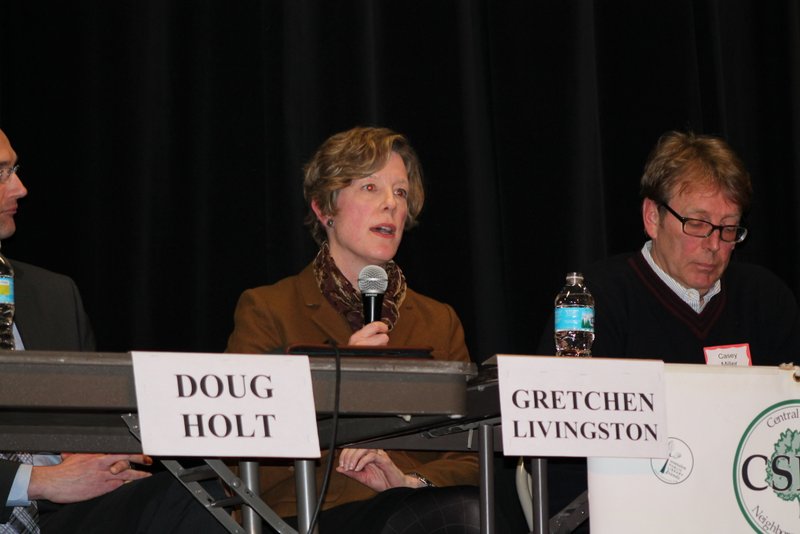Gretchen Livingston
 Central Street Neighbors Association School Board Questionnaire
Central Street Neighbors Association School Board Questionnaire
Candidate for: District 202
Voting address:
2320 Forestview Rd.
Years lived in school district: 23
Campaign website: www.LivingstonD202.com
Campaign phone: 847-644-3204
E-mail address: campaign@livingstond202.com
Other websites on which you post campaign statements or positions: www.facebook.com/LivingstonD202
Campaign Chair: Jane Grover/Jean Anderson
Treasurer: David Livingston
Campaign manager or consultant(s): (Above)
Elective or appointive public or party offices previously held including dates:
School Board Member, District 202 from 2009-present
What is your primary occupation? Attorney
Breifly list your past civic activities. If numerous list here the five most relevant:
- Former Board member, Interfaith Housing Association of the Northern Suburbs (now known as Open Communities);
- Former Board member and Government Relations Chair, Juvenile DiabetesResearch Foundation–IL coordinating federal and state legislative efforts and grassroots advocacy;
- Member (current or past as Board member) of Policy Committee, Finance Committee, Audit Committee, Joint Legislative Task Force, ED-RED, PTSA, School Improvement Team, School Substance Abuse Team, City/School Liaison.
What subjects have you studied and what experience have you had which will be most helpful to you as you serve on the school board?
I have an undergraduate degree in English from the University of Michigan and a law degree from Loyola University, Chicago. As an attorney I worked on complex litigation that required me to work closely with clients to develop clear objectives and understand the positions of the parties. My work required a focus on research and fact-finding, and flexibility to adjust to changing circumstances. My pro bono legal work and my work as a grassroots advocate in Springfield on health issues, demanded that I work with others to achieve difficult objectives. But the experience most helpful to me, after serving on the Board for almost 4 years, is resolving sometimes divisive issues with my colleagues on the Board.
Please list all endorsements you have received so far. You may also use this space if desired to indicate what you consider to be your principal base(s) of support and why you want voters to consider your endorsements or support base.
Peter Braithwaite, Alderman 2nd Ward; Coleen Burrus, Alderman 9th Ward; Jane Grover, Alderman 7th Ward; Delores Holmes, Alderman 5th Ward; Jeff Schoenberg, former State Senator 9th District; Mark Tendam, Alderman 6th Ward; Liz Tisdahl, Mayor; Don Wilson, Alderman 4th Ward; Melissa Wynne, Alderman 3rd Ward. Other supporters too numerous to mention in this space, and representing a wide cross-section of Evanston, are listed at www.LivingstonD202.com. However, voters should not defer to endorsements in deciding for whom to vote, but bring their best thinking to the issues.
Essence of Campaign. Briefly, why are you running and why should a voter give you one of his or her votes? How will electing you make a difference?
I advocated for an inclusive goal setting process that resulted in a 3 year set of District goals that contain measurable objectives—a marked improvement over prior goals. Similarly, I brought in the outside experts who are working to evaluate our freshman year changes. I will see this work through to completion. Looking forward, our partnership with Northwestern, now formalized in an office in our building, will grow. I will urge improved data-sharing and articulation between D65 and D202, which has already grown during my service, and improved collaboration with business that can benefit our students who do not go to 4-year colleges, which has already been a subject of work on the city-school committee on which I serve.
Educational philosophy. American education, and sometimes that in Evanston, is variously criticized as culturally biased in favor of dominant or privileged classes or groups and their culture, as too relativistic, as too coddling and mushy, as failing to prepare students for the 21st century economy, or as failing to teach basics, among others. What principal deficit(s) in American or Evanston education do you see, and what will you do as a local Board member to address this?
Both nationally and in Evanston we see a wide disparity in the achievement level of our students, though students in Evanston beat the state and national averages in many areas. The reasons for this problem are many, and cause for ongoing debate. My role as a local school board member is not to solve the national problem, but to do what I can at the local level to raise the achievement of each student at ETHS by a focus on the individual student. I have done it by advocating for goals that focus on increasing “each student’s academic trajectory” and providing “individualized supports, programs, services, and curricula” to ensure that growth. Evaluating our progress towards these goals, using objective measures, will help us get there.
Superintendent. If elected this April, during your tenure you will have one or more opportunities to fire, hire, or extend the contract of a superintendent. What specific criteria, if any, including any quantitative performance criteria, will you use in your decision?
The contract of the ETHS Superintendent currently runs through 2015, which means that it is a multi-year contract. Under state law, multi-year contracts must be “performance based” and linked to measures of “student performance” and “academic achievement”. One of the reasons I supported a 3 year set of District goals with measurable objectives is that those objectives can help the Board evaluate the Superintendent. For example, our first goal is to “increase each student’s academic trajectory as demonstrated through multiple measures” and one of those targets (among many that can be seen on-line) is “100% of students meeting expected growth.” Progress towards this target, among others, should be relevant in the Superintendent evaluation.
Expenditures. District 202's most recent posted total budget for all funds is over $72 million – which is over $23,000 per student. District median household income is less than $65,000. Is the current expenditure level necessary and sustainable?
About 25% of each property tax bill comes to D202. That amount has held steady for the last 5 years, and remains subject to tax caps. Property tax revenue makes up about 84% of the total budget, and most of that goes to personnel costs. In contrast, the relatively small amount of money that comes back to ETHS in the form of state aid has been cut and paid late, making our reliance on property tax revenue even more important, but not any easier from the perspective of taxpayers. Threats to state funding, including cutting all funding to districts considered property tax “rich”, continue to surface. We have made reductions in our budget, particularly on the operating side, including a newly negotiated teacher’s contract and reductions in purchased services, and have been able to maintain a balanced budget for 5 years.
Tracking. State succinctly and specifically what ETHS should be doing the same, more of, or differently with respect to differentiated or mixed-level instruction, tracking, and the honors program, and why.
ETHS has changed the curriculum for freshman humanities and biology in ways that make it more rigorous (students read more books and write more papers, for example). ETHS needs to continue to do more to improve upon the rigor of the curriculum at every level, including sophomore year, so that students are better prepared for AP courses in the junior year. At the same time, the mix of students in the freshman year has changed (all students reading at or above grade level are in the same class). We are currently evaluating that change, at my urging, to ensure that all students benefit from the changes and that no unintended negative consequences result. We must make adjustments as necessary based on the evaluation that is currently in progress. We must also support teachers in learning how to differentiate in the classroom and we must support students who need extra help to succeed.
Cost Shifting. What should the district be doing to prepare for the possibility that some or all costs of pension financing will be shifted to suburban and downstate districts, as they are for Chicago schools?
ETHS is better prepared than most (67% of IL schools operate in a deficit mode) to absorb a shift because we have a balanced budget for the 5th straight year and a AAA bond rating for the 4th year in a row. We have already reduced the operating side of the budget by reducing administrative expenses and keeping reductions out of the classroom. However, while some urge a pension cost shift, the State has failed to resolve the larger issue of the 95 billion dollar pension liability. The State has cut education funding and delayed required state aid payments to Districts, making financial planning increasingly difficult. Our Districts recently passed a resolution urging resolution of that liability. Until the pension problem is addressed (with or without the shift) financial uncertainties will persist.
- Log in to post comments
